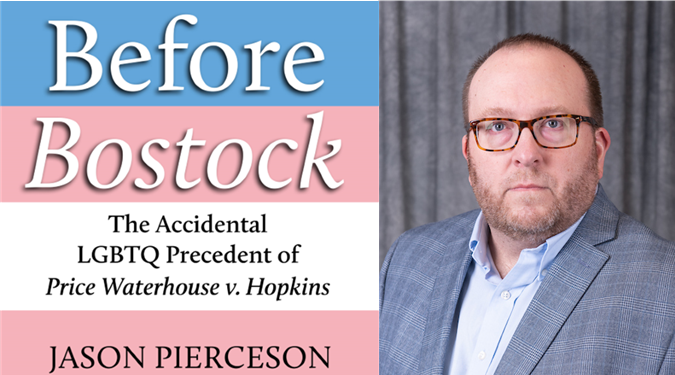
In a book recently published by the University Press of Kansas, Before Bostock: The Accidental Precedent of Price Waterhouse v. Hopkins, I explore the background of the recent landmark LGBTQ rights case of Bostock v. Clayton County (2020). In the case, the Supreme Court ruled that the word “sex” in the Civil Rights Act of 1964 covers gender identity and sexual orientation. While the relevant section of the Act deals with employment discrimination, “sex” appears in a range of federal laws, thus opening the door to increased protections under federal law for LGBTQ individuals beyond employment discrimination. Judges have been, and will be, asked to determine the extent of these protections. In researching the book, I found that federal judges appointed by Democrats were generally supportive of this expanded interpretation, while judges appointed by Republicans were more divided, with some vehemently opposed to this legal trend. This was reflected in the Bostock majority when Chief Justice Roberts and Neil Gorsuch, both Republican appointees, voted with the three Democratic appointees.
Bostock coincided with, some argue caused, a significant proliferation of state-level bills restricting transgender rights, with a smaller but notable surge in enacted and proposed laws limiting discussion of sexual orientation in schools, most notably a Florida law championed by Republican Florida governor Ron DeSantis. The same ideological activists behind these laws have also proposed and supported bans on discussions of race in classrooms. Christopher Rufo of the Manhattan Institute has led this charge. Another leading organization is the Alliance Defending Freedom (ADF), a group that argues that transgender people don’t exist and that sexual minorities should be recriminalized.
While a law professor at Notre Dame, Amy Coney Barrett taught at ADF’s Blackstone Institute, a summer seminar for budding conservative lawyers. ADF led the litigation against Aimee Stephens, a trans woman who was fired from her job as a funeral director after transitioning. Stephens’ case was one of the three cases consolidated in Bostock. Thus, ADF was defeated at the Supreme Court, but they have taken their anti-LGBTQ agenda to state legislatures. They have found willing audiences for their model legislation in our era of state political polarization in Republican-controlled states. They also have allies in the federal judiciary.
Judges have been asked by trans plaintiffs in these states to use Bostock to invalidate these discriminatory measures. After all, if discriminating on the basis of gender identity is discrimination on the basis of sex, a multitude of anti-trans policies are legally suspect. However, judicial ideology will likely to continue to play a role, with the most conservative federal judges applying Bostock in a very limited manner. Judges have a lot of discretion in how they apply precedents. They can put a particular spin on the facts that leads to a limited application, or rejection, of the precedent. They can focus less on the holding of a precedent and more on what is more unsettled in the law or assert that the right protected is trumped by another right. In Before Bostock, I predicted that very conservative judges would engage in a range of tactics to marginalize the clear trend of protecting transgender rights under federal law represented in Bostock.
One area of the law that had been developing in a consistent direction even before Bostock concerned trans students accessing restrooms and locker rooms based upon their gender identity under Title IX. Several circuit courts, the level just below the Supreme Court, found that Title IX required access for trans students. However, the 11th Circuit Court of Appeals, under chief judge William Pryor (George W. Bush), vacated a decision by a three-judge panel ruling in favor of a transgender student and granted a full court, or en banc, hearing. Pryor was the dissenting judge on the three-judge panel. He has been leading the charge against transgender rights protections, along with James Ho (Donald Trump) of the 5th Circuit and others, after he lost a nomination to the Supreme Court under Donald Trump as a result of a pro-transgender rights decision from 2011.
Criticism of that decision by conservatives helped doom his chances for a seat on the high court. His primary contention is that equal treatment for trans students violates the privacy rights of cisgender students. This argument has generally been rejected by federal judges in this realm of litigation. Pryor has also come under criticism for hiring a clerk with a history of making racist statements. If the full court rules against the student, it would create circuit split and invite the Supreme Court to take up the issue.
Recently, a judge confirmed in the last days of the Trump Administration placed a national injunction on Biden Administration and Equal Employment Opportunity Commission guidance on transgender rights in light of Bostock. District Judge Charles Atchley acknowledged the Supreme Court decision but sharply minimized its effects and cited harm to conservative states’ anti-transgender policies from a broad application of Bostock. It seems that the conservative judicial opposition to transgender rights continues, despite the landmark Bostock decision.
________________________________
Jason Pierceson received his Ph.D. in Politics from Brandeis University. His teaching and research focus on public law, the legal and political issues relating to sexuality and gender, and political and legal theory. In 2011, he was the Fulbright Visiting Research Chair in American Studies at the University of Alberta. His commentary has appeared in such media outlets as National Public Radio, Reuters, The New York Times, The Washington Post, The Economist, PolitiFact, The Associated Press, and U.S. News & World Report. He has also served as an expert witness in federal civil rights litigation.
________________________________
The views and opinions expressed on the Capitol Connection Blog are those of the authors and do not necessarily reflect the official policy or position of UIS.
________________________________
If you have questions, feel free to connect with us and request more information!